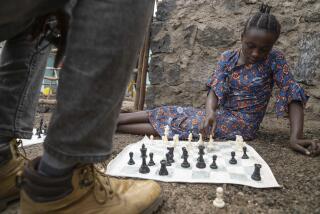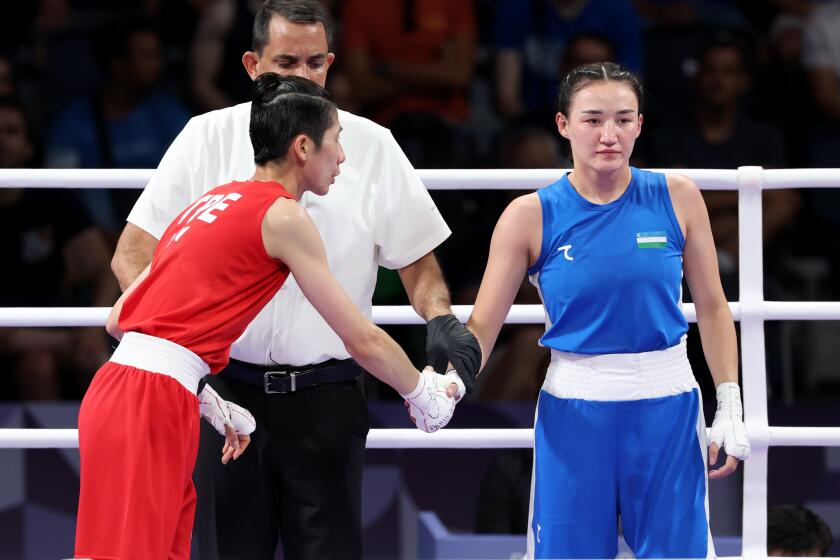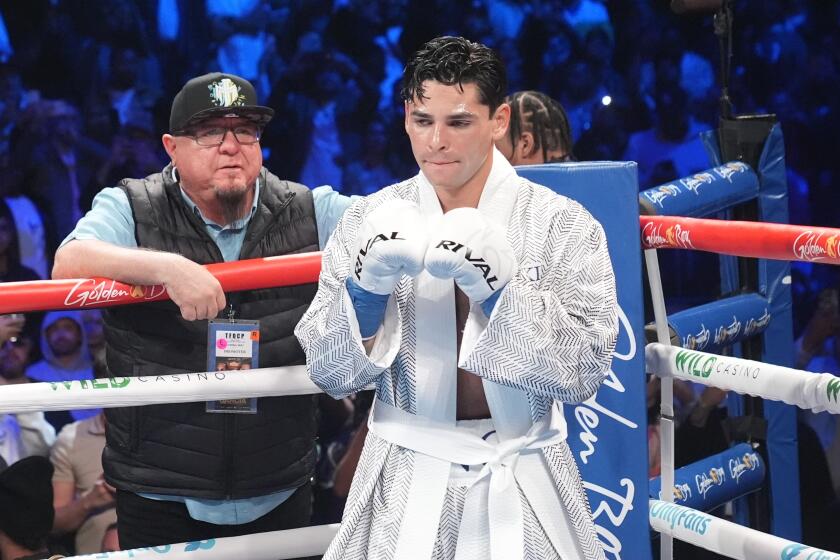From Champion to King
MEMPHIS, Tenn. — It was a good photo op. To think it would lead to anything more seemed unrealistic, a sure path to disappointment.
Lennox Lewis, world heavyweight champion and a devoted chess player, was in town to fight Mike Tyson. Through Will Herenton, the mayor of Memphis, a meeting with a local chess club from Oakhaven Elementary School was arranged.
During a Lewis-Tyson news conference across the state line in nearby Tunica, Miss., some Oakhaven students, ranging from third- to seventh-graders, were introduced to Lewis, who extolled the beauty and wisdom of chess and played a demonstration match with student Carlos Harbert.
Then it was back to business for Lewis, back to the gathered media, back to exchanging threats with Tyson and hyping the pay-per-view telecast.
Along with promising a knockout that day, Lewis promised the kids he’d keep in touch.
A heavyweight champion from Britain who spent much of his time in Jamaica maintaining ties with schoolchildren from a poor section of Memphis? That seemed about as likely as Harbert getting into the ring with Lewis and knocking him out.
*
It has been four years since Lewis met with the young chess players. During that span, he beat Tyson, defended his title again against Vitali Klitschko, then retired in 2003.
These days, Lewis is a boxing analyst for HBO, recently completed a role in a movie and continues to travel the world. But he hasn’t lost touch with the Oakhaven kids, who were his guests at the Tyson fight.
After Lewis left Memphis, a $14,000 check from him arrived to support the team in everything from travel to supplies.
Checks have followed every year, sometimes for as much as $20,000, for what officially became the Lennox Lewis chess team.
The year after meeting Lewis, the team won the U.S. Chess Federation K-8 national championship. The team also has won several state and regional titles.
Lewis returned to Memphis as part of the broadcast crew for last Saturday’s Jermain Taylor-Winky Wright middleweight title fight. Two nights before the bout, Lewis came to the American Way Middle School on the outskirts of Memphis along Interstate 40 for a reunion with the members of his chess team, who are now scattered among area schools.
Again, it was more than a photo op. He stayed more than three hours, listening to the kids talk, sometimes nervously, sometimes excitedly, about their lives and their goals.
And, of course, Lewis found time to play each of them in chess.
“It shocked me when I first met him in Tunica,” said Kenneth Hall, now 16. “All I can remember is that he was really big. I thought at the time I wouldn’t want to have had to fight him.
“I came to realize that he really does care a lot about us. It would have been easy to forget about us once we were out of the spotlight. But he still kept sponsoring us. He has been such a big help. We never would have been able to do what we did without him.”
Many of the students, teachers and parents gathered at American Way marveled at the involvement of an athlete, retired and no longer in need of self-promotion, in a program that is little known outside of Memphis and the chess world.
Lewis, however, deflects the praise as smoothly as he used to deflect punches.
“If you start something,” he said, “it’s important you stay with it. I knew from the beginning what I wanted to do. I wanted to help these kids with their chess and I wanted to help them develop as people.”
When he was still boxing, Lewis saw chess as a vehicle for further developing and honing his skills in the ring.
A visitor to his training camp would find chessboards set up and games frozen in progress all over the place. Lewis would play anybody willing to sit down across from him, whether it was a reporter or a sparring partner.
It drove his trainer, Emanuel Steward, crazy. Steward is old school. He wanted Lewis to concentrate on the opponent with the gloves on, not the one with a chess piece in his hand.
“I saw it as a way to plan my moves in the ring,” Lewis said. “I saw it as a way to relieve stress before a fight and a way to remain focused. If you are not focused in the ring, you can get knocked out. If you are not focused in chess, you can get checkmated.”
*
Math teacher Jeff Bulington also saw chess as more than a game. When he arrived at Oakhaven in 1996, he found such poverty and despair that a fellow teacher once wondered aloud if the students would be better off if they had never been born.
Bulington wasn’t ready to write off a generation of Memphis kids. An avid player himself, he saw chess as a way to galvanize the young minds placed in his charge, keep them off the often dangerous streets and give them new focus.
They already had won a state championship when Lewis came along to take the program to an even higher level.
“We were lucky to be connected to him,” Bulington said. “It was like lashing onto a giant whale that goes by. You get further than you ever would on your own.
“When the parents of our kids, who were poor, saw them competing successfully against affluent kids,” Bulington said, “it said something not only about kids, but about the parents themselves and what’s possible.”
There were problems, however, that even Lewis’ presence couldn’t solve. Several of the kids on the team were West Africans, whose parents had serious reservations about chess because of their Muslim faith.
“They thought the game violated their religion’s prohibition of gambling and [carved] images,” Bulington said.
They also were uncomfortable with the chess pieces, especially a king that had a cross on it.
The turning point came when Bou Bou Diallo, a West African and the father of team members Abdoulaye and Adama Diallo, reluctantly accompanied his kids to a tournament.
“Bou Bou was the leader of a local mosque,” Bulington said. “When he got to the tournament and saw hundreds of kids playing, saw how big a deal it was, he got all choked up and said he had to leave. He was crying.
“I asked him where he was going and he said, ‘I have to pray to God to ask what I did to get this opportunity for my children.’ ”
His son, Abdoulaye has subsequently been accepted at Tennessee Tech with a half scholarship in chess.
“The only way to get better is to play people who are better,” said Bulington, who has moved on to pursue a PhD at Purdue but continues to follow his students from afar. “Once these kids learned the tricks of those around them and outgrew Memphis, they had to get to new towns to learn new tricks. The money from Lennox Lewis made that possible.”
With the benefit of Lewis’ sponsorship, the team has been able to compete in tournaments in Milwaukee, Dallas, Chicago, Atlanta, Orlando, Indianapolis, Tucson, Nashville and Little Rock.
That’s a lot of miles covered from a photo op.
More to Read
Go beyond the scoreboard
Get the latest on L.A.'s teams in the daily Sports Report newsletter.
You may occasionally receive promotional content from the Los Angeles Times.










